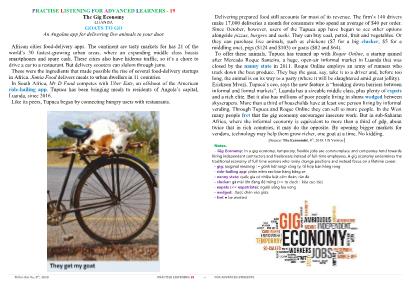Bài thực hành nghe Tiếng Anh nâng cao - Bài 19 - Thẩm Tâm Vy - Năm 2018 (Có âm thanh)
Bạn đang xem tài liệu "Bài thực hành nghe Tiếng Anh nâng cao - Bài 19 - Thẩm Tâm Vy - Năm 2018 (Có âm thanh)", để tải tài liệu gốc về máy bạn click vào nút DOWNLOAD ở trên

Thẩm tâm Vy, 8th, 2018 PRACTISE LISTENING 19 ~ FOR ADVANCED STUDENTS PRACTISE LISTENING FOR ADVANCED LEARNERS - 19 The Gig Economy LUANDA GOATS TO GO An Angolan app for delivering live animals to your door African cities food-delivery apps. The continent are tasty markets for has 21 of the world’s 30 fastest-growing urban areas, where an expanding middle class boasts smartphones and spare cash. These cities also have hideous traffic, so it’s a chore to drive a car to a restaurant. But delivery scooters can slalom through jams. These were the ingredients that made possible the rise of several food-delivery startups in Africa. Jumia Food delivers meals to urban dwellers in 11 countries. In South Africa, Mr D Food competes with Uber Eats, an offshoot of the American ride-hailing app. Tupuca has been bringing meals to residents of Angola’s capital, Luanda, since 2016. Like its peers, Tupuca began by connecting hungry users with restaurants. Delivering prepared food still accounts for most of its revenue. The firm’s 140 drivers make 17,000 deliveries a month for consumers who spend an average of $40 per order. Since October, however, users of the Tupuca app have begun to see other options alongside pizzas, burgers and sushi. They can buy coal, petrol, fruit and vegetables. Or they can purchase live animals, such as chickens ($7 for a big clucker, $5 for a middling one), pigs ($124 and $103) or goats ($82 and $64). To offer these animals, Tupuca has teamed up with Roque Online, a startup named after Mercado Roque Santeiro, a huge, open-air informal market in Luanda that was closed by the nanny state in 2011. Roque Online employs an army of runners who track down the best produce. They buy the goat, say, take it to a driver and, before too long, the animal is on its way to a party (where it will be slaughtered amid great jollity). Erickson Mvezi, Tupuca’s ceo, says the new feature is “breaking down barriers between informal and formal markets”. Luanda has a sizeable middle class, plus plenty of expats and a rich elite. But it also has millions of poor people living in slums wedged between skyscrapers. More than a third of households have at least one person living by informal vending. Through Tupuca and Roque Online they can sell to more people. In the West many people fret that the gig economy encourages insecure work. But in sub-Saharan Africa, where the informal economy is equivalent to more than a third of gdp, about twice that in rich countries, it may do the opposite. By opening bigger markets for vendors, technology may help them grow richer, one goat at a time. No kidding. [Source: The Economist, 8th, 2018, US Version] Notes. - Gig Economy: In a gig economy, temporary, flexible jobs are commonplace and companies tend towards hiring independent contractors and freelancers instead of full-time employees. A gig economy undermines the traditional economy of full-time workers who rarely change positions and instead focus on a lifetime career. - gig; (original meaning : = gánh hát rong) công ty, tổ hợp bán hàng rong - ride-hailing app: phần mềm rao bán hàng bằng xe - nanny state: quốc gia có nhiều luật cấm đoán, răn đe - clucker: gà mái lớn đang đẻ trứng (<= to cluck : kêu cục-tác) - expats (<= expatriate): người sống lưu vong - wedged: được chèn vào giữa - fret = be worried
Tài liệu đính kèm:
 bai_thuc_hanh_nghe_tieng_anh_nang_cao_bai_19_tham_tam_vy_nam.pdf
bai_thuc_hanh_nghe_tieng_anh_nang_cao_bai_19_tham_tam_vy_nam.pdf 01. Gig Econmy (Slow).mp3
01. Gig Econmy (Slow).mp3 02. Gig Economy (Normal).mp3
02. Gig Economy (Normal).mp3





